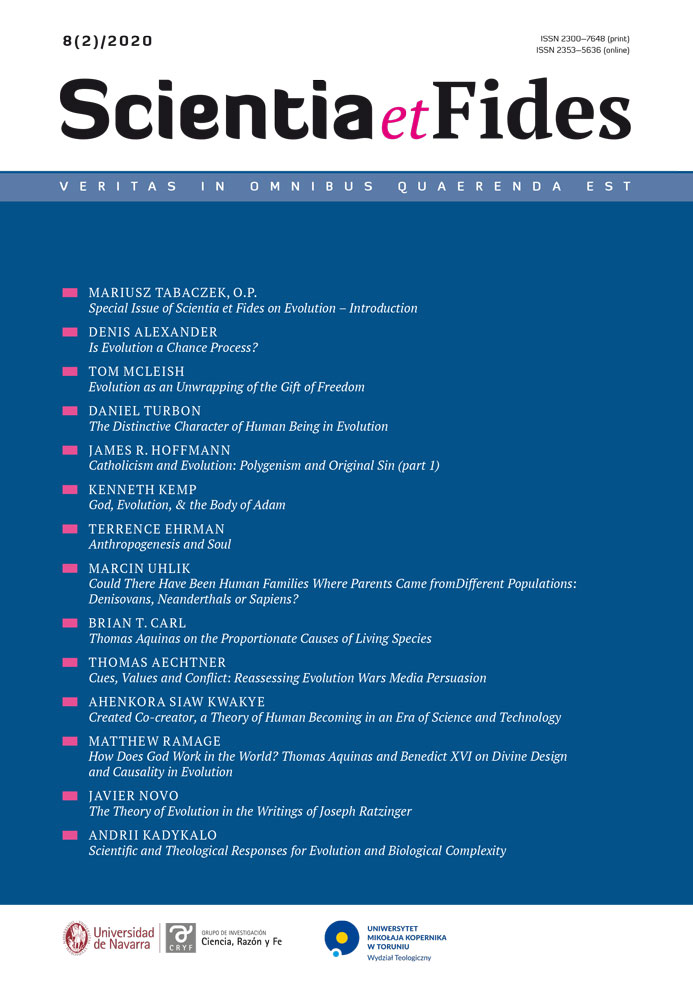Created Co-creator, a Theory of Human Becoming in an Era of Science and Technology
DOI:
https://doi.org/10.12775/SetF.2020.022Keywords
Created Co-creator, Cyborg, Hefner, Evolution, Creation, Religion, ScienceAbstract
Scientific discoveries and the emergence of cosmological theories such as the Big Bang Theory and evolution have challenged the Christian doctrine of creation and its reliability on many fronts, because the discoveries appear to contradict the Christian account as to how creation unfolded. Hefner sees the situation as an additional interpretative task to theologians. He, however, posits that scientific discoveries are an opportunity to communicate the Christian message through social and scientific experience to bring meaning to broader society. He expresses the notion that religion will remain relevant only if it measures up to science, because we are in a science and technology era. Hefner, therefore, introduced the concept of created co-creator as a metaphor and analytical tool to explain the meaning and purpose of humans within the biosphere. The concept is characterized by the ability to communicate religion through science and to relate with available models of origin. This work expounds on the concept of created co-creator’s ability to explain human technological trajectory in theology. There is also an effort to establish a relationship between Hefner’s concept and Haraway’s cyborg with an emphasis on the concept’s ability to communicate the Christian doctrine of creation through scientific knowledge and why such an enterprise is useful.
References
Ayala, Francisco J. 2008. From Paley to Darwin: Design to Natural Selection. In Back to-Darwin: A Richer Account of Evolution. Edited by John B. Cobb Jr. Grand Rapids, Michigan, Cambridge: William B. Eerdmans, 50–70.
Barbour, Ian. 1966. Issues in Science and Religion. New York: Vantage.
Bentley, Wessel. 2017. “Are we special? A critique of imago Dei.” HTS Teologiese Studies/ Theological Studies 73: 2072–8050.
Bostrom, Nick. 2003. “Human Genetic Enhancements: A Transhumanist Perspective.” The Journal of Value Inquiry 37: 493–506.
Bostrom, Nick. 2005. “Review of Contemporary Philosophy.” Transhumanist Values 4: 87–101.
Burhoe, Ralph W. 1981. Toward a Scientific Theology: Essays on the Relation of Science to Religion. Belfast: Christian Journals Limited.
Coomaraswamy, Ananda K. 1957. “The Dance of Shiva,” In the Dance of Shiva: Fourteen Indian Essay. New York: The Noonday Press.
Csikszentmihalyi, Mihaly. 2000. “The Mythic Potential of Evolution.” Zygon: Journal of Religion and Science, 35: 25–38.
Ecklund, Elaine Howard. 2019. Science vs. Religion; What Scientists Really Think. USA: Oxford University Press Inc.
Ellul, Jacques. 1964, 1954. The Technological Society. Translated by John Wilkinson. New York: Vintage Books.
Faith and Order Paper 119. 2018. World Council of Churches, Geneva, accessed January 20. http://www.oikoumene.org/en/what-we-do/faith-and-order.
Fisher, Helen E. 2011. “Serial monogamy and clandestine adultery: evolution and consequences of the dual human reproductive strategy,” In Applied Evolutionary Psychology. Edited by S. Craig Roberts. Oxford: Oxford University Press, 93–112.
Gleiser, Marcelo. 2005. The Dancing Universe: From Creation Myths to the Big Bang. Dartmouth: College Press.
Haraway, Donna. 2000. A Cyborg Manifesto: Science, Technology and Socialist-Feminism in the Late Twentieth Century. In The Cybercultures Reader. Edited by David Bell and Barbara M. Kennedy. London, New York: Routledge.
Hefner, Philip. 1993. The Human Factor: Evolution, Culture and Religion. Minneapolis: Fortress Press.
Hefner, Philip. 2006. Spiritual Transformation and Healing: Anthropological, Theological, Neuroscientific, and Clinical Perspectives. Edited by Joan Koss-Chioino and Philip Hefner. Oxford, UK: Altamira Press.
Hefner, Philip. 2004. “The Created Co-Creator Meets Cyborg,” accessed February 6, 2020, http://www.metanexus.net/essay/created-co-creator-meets-cyborg.
Hefner, Philip. 1984. “The Doctrine of Creation.” In Christian Dogmatics; The Creation. Edited by Carl E. Braaten and Robert W. Jenson. Philadelphia: Fortress Press.
Kull, Anne. 2000. “A Theology of Technonature Based on Donna Haraway and Paul Tillich.” PhD diss., University of Chicago.
Kull, Anne. 2016. “Cyborg and Religious? Technonature and Technoculture.” Scientia et Fides 4: 295–311.
Lenski Richard E. 2012. “Evolution in Action A 50,000-Generation Salute to Charles Darwin.” In Microbes and Evolution: The World That Darwin Never Saw. Edited by Maloy, S. R., & Kolter, R. Washington, DC: ASM Press.
Lipowicz, Markus. 2009. “Overcoming Transhumanism: Education or Enhancement towards the Overhuman?” Journal of Philosophy of Education 53: 200–214.
Tielhard, Pierre de Chardin. 1959. The Phenomenon of Man. Translated by Bernard Wall. France: William Collins.
Tielhard, Pierre de Chardin. 1968. The Future of Man. Translated by Norman Denny. New York: Harper & Row.
Torrance, Thomas F. 1969. Theological Science. London: Oxford University Press.
Wellum, Stephen J. 2009. “The Urgent Need for a Theological Anthropology Today.” The Southern Baptist Journal of Theology 13: 2–3.
Westhelle, Vítor. 2004. “The Poet, The Practitioner, and the beholder: Remarks on Philip Hefner’s Created Co-Creator.” Zygon 39: 747–754.
Yecla, Gem. 2019. “Co-Creation Spirituality Participating in God’s Ongoing Work of Crea-tion through Spiritual Direction and the Spiritual Exercises.” The Way 58: 7–18.
Downloads
Published
How to Cite
Issue
Section
License
Copyright (c) 2020 Scientia et Fides

This work is licensed under a Creative Commons Attribution-NoDerivatives 4.0 International License.
CC BY ND 4.0. The Creator/Contributor is the Licensor, who grants the Licensee a non-exclusive license to use the Work on the fields indicated in the License Agreement.
- The Licensor grants the Licensee a non-exclusive license to use the Work/related rights item specified in § 1 within the following fields: a) recording of Work/related rights item; b) reproduction (multiplication) of Work/related rights item in print and digital technology (e-book, audiobook); c) placing the copies of the multiplied Work/related rights item on the market; d) entering the Work/related rights item to computer memory; e) distribution of the work in electronic version in the open access form on the basis of Creative Commons license (CC BY-ND 3.0) via the digital platform of the Nicolaus Copernicus University Press and file repository of the Nicolaus Copernicus University.
- Usage of the recorded Work by the Licensee within the above fields is not restricted by time, numbers or territory.
- The Licensor grants the license for the Work/related rights item to the Licensee free of charge and for an unspecified period of time.
FULL TEXT License Agreement
Stats
Number of views and downloads: 1240
Number of citations: 1



